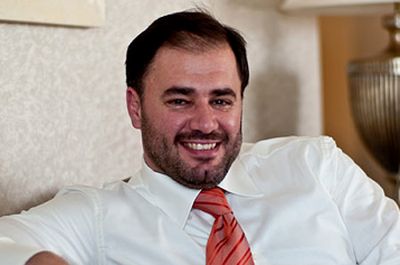
The Qatari-based Al-Jazeera channel announced the resignation of its director general, Wadah Khanfar, and his replacement by a member of the royal family, Sheikh Hamad Ben Jassem Al-Thani on September 20, 2011.
Sheikh Hamad is a Qatargas executive, and spent a year at the head office of Total in Paris. He is the former chairman of the Al-Jazeera Board of Directors.
This development is protrayed by the Atlanticist media in three different ways: either as a forced resignation and a takeover of the channel by the State, as a revenge on the part of the Palestinian Authority following the release of the Palestinian Papers and, finally, as the result of the Wikileaks leak exposing some of the connections between Mr. Khanfar and the United States.
While each of these interpretations may contain some truth, they nevertheless obscure the overriding factor: the role of Qatar in the war against Libya. At this point, a flash backwards is called for.
Al-Jazeera’s origins: a desire for dialogue
Al-Jazeera was conceived by two French-Israeli personalities, the David and Jean Frydman brothers, after the assassination of their friend Yitzhak Rabin. According to David Frydman [1], the goal was to create a medium where Israelis and Arabs could discuss freely, exchange arguments and get to know each other, considering this was prevented by the war situation thereby frustrating any peace prospect.
For the creation of the channel, the Frydman brothers benefited from a combination of circumstances: the Orbit Saudi company had reached an agreement with the BBC to set up a news broadcast in Arabic. But the political demands posed by the absolutist Saudi monarchy quickly proved incompatible with the professional independence of British journalists. The agreement was terminated and the majority of Arabic BBC journalists found themselves out on the street. They were then recruited to launch Al-Jazeera.
The Frydman brothers were eager to have their television perceived as an Arabic channel. They managed to enlist the new emir of Qatar, Hamid bin Khalifa al-Thani, who with the help of London and Washington had just overthrown his father, accused of pro-Iranian sentiments. Sheikh Hamad bin-Khalifa soon realized the potential advantages of being at the center of the Arab-Israeli discussions, which had already lasted for more than half a century and were likely to drag on even longer. At the same time, he authorized the Israeli Ministry of Commerce to open an office in Doha, unable to open an embassy. Above all, he saw the interest for Qatar to compete with the wealthy pan-Arab Saudi media and to own a media that could criticize everyone except himself.
The initial financing package included both a down payment from the Frydman brothers and a loan from the Emir of $ 150 million over 5 years. A boycott by the advertisers, organized by Saudi Arabia, and the ensuing scantiness of advertising revenues finally led to the modification of the initial plan. Ultimately, the Emir became the donor of the channel and hence its sponsor.
Exemplary journalists
For years, Al-Jazeera’s audience was captivated by its internal pluralism. The channel took pride in giving free rein to opposing viewpoints. The idea was not to tell the truth, but to have it spring from the debate. Its flagship program - the talk show hosted by the iconoclastic Faisal al-Qassem entitled "The contrary view" - took delight in shaking up prejudices. Everyone could find reason to eulogize certain programs and to deplore others. Regardless, this effervescence prevailed over the monolithism of its competitors and changed the Arab audiovisual landscape.
The heroic role of its reporters in Afghanistan and in the 2003 Gulf War, as well as their exemplary work in contrast to the propaganda of the pro-US satellite channels, catapulted Al-Jazeera from a controversial channel to a acclaimed media outlet. Its journalists paid a high price for their courage: George W. Bush stopped short from bombing the Doha studios, but had Tareq Ayyoub assassinated [2], arrested Tayseer Alouni [3], and imprisoned Sami al-Hajj at Guantanamo Bay [4].
The 2005 reorganization
However, all good things come to an end. In 2004-05, after the death of David Frydman, the Emir decided to overhaul Al-Jazeera completely and create new channels, including Al-Jazeera English, at a time when the global market was changing and all major States were equipping themselves with news satellite channels. The moment had come to leave the excitement and impudence of the early period behind in order to capitalize on an audience now reaching 50 million viewers, and to position itself as a player in the globalized world.
Sheikh Hamad bin-Khalifa called on an international firm that had already provided him with personal training in communication skills. JTrack had especially targeted Arab and Southeast Asian leaders to train them in the language of Davos: how to project an image that the West wants to see. From Morocco to Singapore, JTrack has trained most of the political leaders backed by the United States and Israel, often mere heredity puppets, turning them into respectable media personalities. The important thing is not whether they have something to say, but their aptness to impart the globalized rhetoric.
However, having been assigned to high government positions in North Africa, the CEO of JTrack had to withdraw before completing the transformation of the Al-Jazeera Group. He handed over the rest of the operations to a former Voice of America journalist who had been working for the Qatari channel for several years and who belonged to the same Muslim congregation as him: Wadah Khanfar.
Both professionally competent and politically safe, Mr. Khanfar strove to give Al-Jazeera an ideological tinge. While giving a voice to Mohamed Hassanein Heikal, Nasser’s former spokesman, he appointed Sheikh Yusuf al-Qaradawi - whom Nasser had stripped of his Egyptian nationality - the channel’s "spiritual counselor".
The 2011 shift
With the revolutions in North Africa and the Arabian Peninsula, Wadah Khanfar dramatically changed Al-Jazeera’s editorial policy. The Group played a central role in lending credence to the "Arab spring" myth, according to which the people - eager to live in a Western-style society - had risen to overthrow their dictatorial regimes and switch to parliamentary democracies. No distinction was made between the events in Tunisia and Egypt, and those in Libya and Syria. As for the popular movements in Yemen and Bahrain, they did not draw enough viewers!
In reality, the Anglo-Saxons tried to take advantage of the popular revolts to replay the same "Arab spring" scenario that they had staged in the 1920s to take possession of the former Ottoman provinces and install puppet parliamentary democracies under Western tutelage. Al-Jazeera’s coverage of the Tunisian and Egyptian revolts was designed to dampen the flames of revolution and to legitimize the governments aligned with the United States and Israel. In Egypt the uprising was harnessed in the interest of a single element of the opposition: the Muslim Brotherhood, embodied by the channel’s star preacher ... Sheikh Yusuf al-Qaradawi.
Outraged by the new editorial policy and the increasingly frequent recourse to lies [5], a certain number of journalists, including Ghassan Ben Jedo, walked out slamming the door behind them.
Who’s pulling the information strings?
Nevertheless, it wasn’t until the Libyan episode that the masks started to fall. In fact, the boss of JTrack and mentor of Wadah Kanfhar is none other than Mahmoud Jibril (the "J" in "JTrack" stands for "Jibril"). This friendly, brilliant yet shallow, manager had been recommended to Muammar Gaddafi by his new American friends to pilot the economic opening of Libya after the normalization of its diplomatic ties. Under Saif el-Islam Gaddafi’s control, he was appointed both Minister of Planning and Director of the Development Authority, thus becoming de facto the number two man in the government, having authority over other ministers. At breakneck speed, he forged ahead with the deregulation of Libya’s socialist economy and the privatization of its public enterprises.

Through his JTrack training activities, Mahmoud Jibril established personal relationships with almost all the Arab and Southeast Asian leaders. He had offices in Bahrain and Singapore. In addition, Mr. Jibril created trading companies, including one dealing with Malaysian and Australian timber in partnership with his French friend, Bernard-Henri Levy.
Mahmoud Jibril started his university studies in Cairo, where he met and married the daughter of one of Nasser’s ministers. He later continued his studies in the United States, where he assimilated the libertarian views that he tried to inject into al-Gaddafi’s anarchist ideology. But, more importantly, in Libya Mr. Jibril joined the Muslim Brotherhood. It was in this capacity that he placed his coreligionists, Brothers Wadah Kanfhar and Yusuf al-Qaradawi, in Al-Jazeera ..
During the first half of 2011, the Qatari channel became the preferred instrument for pro-Western propaganda: it went to great lengths to obscure the anti-imperialist and anti-Zionist aspect of the Arab revolutions and, in each country, it picked the actors it intended to support and those it decided to deprecate. Not surprisingly, it supported the king of Bahrain, a student of Mahmoud Jibril, who had his people gunned down, while Al-Jazeera’s spiritual counsellor, Sheikh al-Qaradawi, was calling for a Jihad over the air against al-Gaddafi and el-Assad, falsely accusing them of murdering their own people.
With Mr Jibril as prime minister of the rebel government of Libya, the height of duplicity was reached when a replica of the Green Square and Bab-el-Azizia was built in the studios of Al-Jazeera in Doha, where footage of false images was shot portraying pro-US "insurgents" entering Tripoli. Need I mention the insults I received when I denounced this manipulation in the columns of Voltairenet.org? Yet Al-Jazeera and Sky News broadcasted these false images on the second day of the Battle of Tripoli, sowing confusion among the Libyan people. It was actually only three days later that the "rebels" - almost exclusively from Misrata - entered Tripoli, devastated by NATO’s bombs.
The same goes for the announcement by Al-Jazeera of Saif el-Islam Gadhafi’s arrest and the confirmation of his capture by the prosecutor of the International Criminal Court Luis Moreno-Ocampo. I was the first, through Russia Today, to warn against the manipulation. And again, I was ridiculed by some newspapers, until Saif el-Islam turned up in person to wake up the journalists holed up at the Rixos Hotel and led them to the real Bal el-Azizia square.
Questioned about such lies by channel France24 in Arabic, the president of the National Transitional Council (CNT), Mustafa Abdul Jalil, chalked it up to a war stratagem and said he was delighted to have thus accelerated the fall of the Jamahiriya.
What future for Al-Jazeera?
The conversion of Al-Jazeera into a propaganda tool for the recolonisation of Libya was not achieved without the knowledge of the emir of Qatar, but indeed under his leadership. The Gulf Cooperation Council was the first to call for an armed intervention in Libya and Qatar was the first Arab country to join the Contact Group. He funneled weapons to the Libyan "rebels" before sending in his own ground troops, especially during the Battle of Tripoli. In exchange, he obtained the privilege of controlling all the oil trade on behalf of the National Transitional Council.
It is too early to say whether the resignation of Wadah Khanfar marks the end of his mission in Qatar, or if it heralds the channel’s desire to recover the credibility that took 15 years to build and only 6 months to lose.
[1] See interviews with the author
[2] "The war on al-Jazeera", by Dima Tareq Tahboub, The Guardian, 4 October 2003.
[3] “The Arab press in the firing line”, Voltaire Network, 15 September 2003.
[4] See our dossier on Sami al-Hajj
[5] For example: "Al-Jazeera staged huge rally in Moscow against Bashar al-Assad”, Voltaire Network, 4 May 2011.

